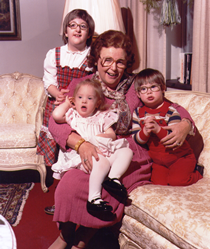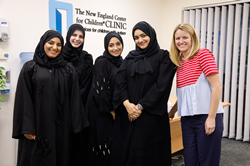
Dr. Gertrude Barber was a tireless and compassionate advocate for children with intellectual disabilities.
“Dr. Barber served as a model for all of us to become more giving and to see God in one another.” –The Most Rev. Lawrence T. Persico, bishop of Erie
ERIE, Pa. (PRWEB)
December 17, 2019
The formal process to begin investigations concerning the possible canonization of the late Dr. Gertrude A. Barber as a saint in the Catholic Church is under way.
Dr. Gertrude Barber, founder of the Barber National Institute, was a renowned Erie educator and woman of faith who dedicated her life to serving children and adults with intellectual disabilities/autism and their families.
The Most Rev. Lawrence T. Persico, bishop of Erie, issued a decree on Dec. 12, the feast of Our Lady of Guadalupe, opening the cause for canonization of Dr. Barber. It is one of the first steps in a process that likely will take decades or longer.
Bishop Persico announced the opening of the cause during a gathering of friends and family with staff, students and adults at the Barber National Institute Dec. 17. The decree announcing the cause will be shared in Catholic churches across the Diocese of Erie the weekend of Dec. 28/29. It also can be found at http://www.DrBarber.org.
“It is an honor to open the cause for sainthood for Dr. Gertrude Barber,” Bishop Persico said. “Her family members, and the thousands of families who have been touched by the work she initiated in her lifetime, are surely thrilled to be part of this historic moment. But I am particularly pleased that the good work of Dr. Barber, motivated by her Catholic faith and undertaken on behalf of those in need, will now be known more fully by those throughout our region and beyond.”
Although Dr. Barber passed away years before Bishop Persico was assigned to serve in the Diocese of Erie, he noted he had heard about the good works and faith commitment of Dr. Barber from his earliest days in the diocese.
“It has been my privilege to visit the National Barber Institute on several occasions, and to offer Mass here,” he said. “I know the family and staff is deeply committed to carrying out the mission she established.”
Bishop Persico first recognized the Association for the Cause of Gertrude A. Barber, a public association of the faithful, in August 2019. The association includes within its members the parent of a child with a disability, supporters, Barber National Institute staff and Barber family members. The association formally submitted a petition for the cause to the bishop in October.
John Barber, nephew of Dr. Barber and president of the Barber National Institute, said those privileged to know Dr. Barber saw her devotion to God and her dedication to serving those who were often forgotten by society.
“Dr. Barber served as a model for all of us to become more giving and to see God in one another,” he said. “She established the philosophy which we at the Barber National Institute live by, which is ‘all children are welcome here.’ I know that she would look at this honor today not as a recognition of her, but as an honor for the children and adults she served.”
Bishop Persico also has approved the appointment of Msgr. Thomas McSweeney, a retired priest and former director of the Office of Evangelization for Communications of the Diocese of Erie, to serve as diocesan postulator for the cause.
In this role, Msgr. McSweeney will be the main point of contact for the gathering of documentation and formal interviews with anyone wishing to discuss their interactions with Dr. Barber during her lifetime. The testimony will become part of the official documentation considered during the canonization process, all of which will eventually be sent to the Vatican.
Although any Christian can properly be called “Servant of God,” in practice, the term is often applied to those whose cause for canonization has been opened. Dr. Barber will be referred to hereafter as “Servant of God.”
With the historic announcement, a formal inquiry will begin a review of her life, work and holiness. Dr. Barber left a legacy of deep compassion and groundbreaking advancements in educating and empowering those with intellectual disabilities in her nearly 70 years of service.
With the opening of her cause, Dr. Barber becomes the first layperson on the list of other Pennsylvanians whose causes for canonization are currently under way. They include Sister Teresa of Jesus Lindenberg, a Carmelite sister from Allentown; Father Walter Ciszek, a Jesuit priest from Allentown; Father Demetrius Gallitzin, a diocesan priest from Altoona-Johnstown; and Father William Atkinson, an Augustian priest from Philadelphia.
The only Pennsylvania native to date to earn the rare designation of saint within the Catholic Church is Saint Katharine Drexel, a sister who founded schools for Native American and African American children, who was canonized in 2000. A Philadelphia native, St. Katharine Drexel died in 1955. Additionally, Saint John Neumann, born in what is now the Czech Republic, served as bishop of Philadelphia and was canonized in 1977.
Other Pennsylvania natives whose causes are opened in other states include Sister Cornelia Connelly, founder of the Society of the Holy Child Jesus and a native of Philadelphia, and Fr. John Anthony Hardon, a Jesuit priest born in Midland in Beaver County.
At various steps in the canonization process, further consultation is required in order to proceed. Bishop Persico will eventually need to consult the United States Conference of Catholic Bishops regarding his decision to open the cause, at which point the bishops will vote on whether the cause should proceed.
About Gertrude Barber:
Gertrude Barber was well known in Pennsylvania and throughout the United States for her advocacy on behalf of children with intellectual disabilities and their families.
She took up the mission when, as an assistant supervisor in the Erie School District, she had to tell parents of children with special needs that services were not available for their children in their community. She was deeply affected as she saw parents face the options of either keeping their children at home without access to an education and training, or sending them to a distant institution.
Dr. Barber became determined to find another way. She believed that all individuals, regardless of their disability, have unique gifts to offer, and have the right to live to their fullest potential. The idea that children with disabilities could be educated and reside in their own communities was largely unheard of in the early 1950s.
Dr. Barber began meeting with parents and, in 1952, opened the first class for children with intellectual disabilities in a room borrowed from the YMCA. She soon initiated classes for children with vision and hearing impairments, and opened training programs for adults with intellectual disabilities at locations around Erie.
In 1958, with the discovery of the polio vaccine, the City of Erie closed its former communicable disease hospital located on Erie’s east bayfront and leased the facility that would become the Barber Center. According to Dr. Barber, her students at last had, “the first place we could really call home.”
Dr. Barber’s commitment to her service was founded in a deep devotion to her Catholic faith, fostered since childhood. Gertrude was born in Erie on Sept. 16, 1911, to Kathryn Cantwell Barber, a recent immigrant from Ireland, and John Barber. Her father died in the flu epidemic of 1918, leaving her mother to care for Gertrude, her two sisters and five brothers.
Dr. Barber grew up in the shadow of St. Ann’s Church, attending the parish school and continuing as a parish member all of her life. She attended Villa Maria Academy and Edinboro Normal School (now Edinboro University) before earning a bachelor’s, master’s and doctoral degree from the Pennsylvania State University.
She became a teacher in the Erie School District in 1931 during the height of the Great Depression, and moved into roles as school psychologist and administrator. She continued with the Erie School District until 1971, when she resigned to become the full-time administrator at the Barber Center.
Dr. Barber oversaw the expansion of services that span the lifetime, from early intervention services for infants and toddlers to the opening of a center for adults in their senior years. She also responded to requests from locations throughout the state, opening residential group homes and adult day services in the Philadelphia and Pittsburgh regions.
During her lifetime, Dr. Barber received scores of educational, civic and religious awards and recognitions. But the title she valued most was “teacher,” as she continued to inspire acceptance of persons with disabilities in all parts of society.
She wrote the Barber National Institute philosophy: “All persons are children of God …with feelings, emotions, needs and capabilities unique to these persons and their heritage. In a world where all persons differ, everyone should have the opportunity to develop to their fullest potential.”
Dr. Barber died suddenly on April 29, 2000, as the Barber Center was in the midst of a capital campaign to build a new school and state-of-the-art training center. Her legacy continues to be carried out today as 3,900 employees statewide provide a range of services for more than 7,200 children and adults with autism, intellectual and physical disabilities and behavioral health challenges and their families.


















